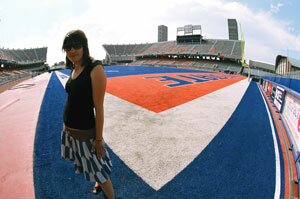THE SPORTS DOCTOR- BCS rankings: Boise will be Boise— but why?

Boise State, Boise State, Boise State. Last week I thought if I had to hear about Boise State one more time, I'd scream.
They're undefeated and underrated; I get it. But come on– what makes them so special?
Then I understood: if even ESPN, the BCS's biggest cheerleader, failed to realize exactly how unfair the Bowl Championship Series rankings really are, the conspiracy theorists must be onto something (cue the X-Files theme).
Back on October 11, a week before the first BCS standings were announced, ESPN was aflutter with love for Boise State. The network was confident enough in the work of Brad Edwards, its college football researcher, to dedicate an episode of Outside the Lines to his findings: Boise State would not only be first in the BCS rankings, they'd be first by a lot (a projected .913 average to second place Oregon's .863).
When the official rankings were released, Boise State was ranked third, not first, with a .889 average; Oklahoma was first with .921, and Oregon second with .892. What happened? How could even ESPN have gotten it so wrong?
In 2009 the National Assessment of Educational Progress found that fourth-graders had made no learning gains in math since 2007. Earlier this year, a report by ACT, the testing service, found that only about 42 percent of U.S. high-school graduates it tested were ready for college-level math. The most recent results from the SAT college-entrance exam also showed no improvement in math. (I guess ACT had access to people who were ready for college math). Factor in how many of that 42 percent actually went to college, and then how many of the remaining percentage took statistics and understood it, and how many of those people still understood it after college, and you'll find that maybe six people in America truly understand the BCS ranking system.
Just like Enron and Lehman Brothers, the BCS hides behind a math shield, knowing few people are brave enough or smart enough to attack it. Numbers and percentages and multiplying and dividing and points are each daunting enough, but mix them all together with six different ranking systems and inverse order, and you've got a statistical Gordian knot no sword can cut.
That's exactly how the BCS wants it. They're hiding behind all the official-sounding math– ESPN, the coaches, the schools, the AP– because they're too scared to address how arbitrary and skewed the BCS rankings really are.
It's like money: it may look important, but it's really just paper. BCS rankings may seem important, but they're really just a scam.
BCS's official explanation of the formula is on its website, but who cares? What you really need to know is that the Harris Poll panel is made up of coaches, players, and media, the USA Today poll is made up of coaches– and the those folks behind the six computer ranking systems? Jeff Anderson and Chris Hester went to Washington, Richard Billingsley was born in and has never lived anywhere but Oklahoma, Wesley Colley (though he got his BA at UVA) currently works at the University of Alabama, Jeff Sagarin went to MIT and Indiana, and Peter Wolfe is a professor at UCLA.
Even if there isn't any cheating per se, the BCS system is fertile ground for bias. Coaches and players polled– are you kidding? And the computer guys (they're all men) all made up their own ranking system. They each factored in things they thought were important– and guess what? The majority of Americans, me included, are too stupid to understand how math like that works anyway.
What the BCS needs to realize, as Enron ultimately did, is that not even math can blind Americans to unfairness forever, and the BCS is inherently unfair. Boise State may not deserve to be ranked number one (I couldn't make a mathematical formula from it, but strength of schedule does mean something), but they and every other non-BCS conference school (Utah, TCU, etc.) either needs to be treated with the same respect as Alabama or not taken into consideration at all.
Maybe that's the answer to all those pesky championship problems– a united non-BCS conference. But that's a column for another day.
~
Juanita Giles lives on a farm in Charlotte County with her husband, son, and many dogs.
#